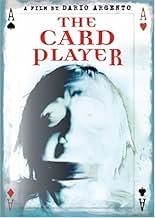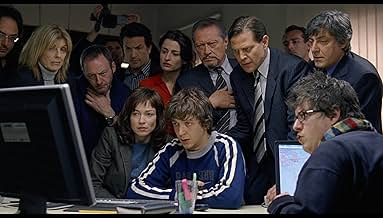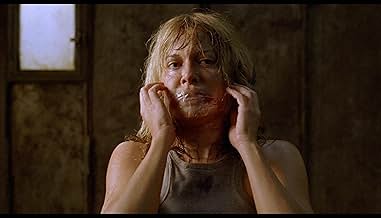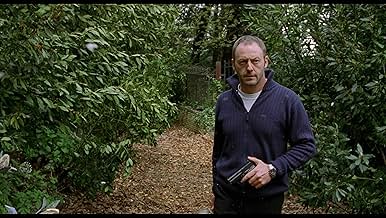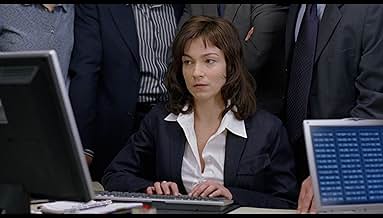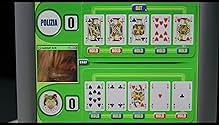NOTE IMDb
4,9/10
5,8 k
MA NOTE
Ajouter une intrigue dans votre langueA Rome policewoman teams up with a British Interpol agent to find a crafty serial killer who plays a taunting game of cat-and-mouse with the police by abducting and killing young women and s... Tout lireA Rome policewoman teams up with a British Interpol agent to find a crafty serial killer who plays a taunting game of cat-and-mouse with the police by abducting and killing young women and showing it over an Internet web cam.A Rome policewoman teams up with a British Interpol agent to find a crafty serial killer who plays a taunting game of cat-and-mouse with the police by abducting and killing young women and showing it over an Internet web cam.
- Réalisation
- Scénario
- Casting principal
- Récompenses
- 1 nomination au total
Pier Maria Cecchini
- Flying Squad Chief
- (as Piermaria Cecchini)
Avis à la une
What can I say about this film? It certainly is not a typical Argento film (and I mean that in a very broad sense - there are some things you expect from an Argento film, like gore, tension and a certain visual style), but is it really bad? Well, it's not a terrible movie but from the man that gave us Suspiria, Deep Red and Tenebrae I expected much more.
First of all it's not giallo but more of a run of the mill detective story. Now, this wouldn't be bad if it was a good detective story, but it's not. The identity of the killer was predictable and some parts of the story did not make any sense. On top of that, the acting was not very good and the music was at best tolerable. And the final scene was just bad and did not make much sense.
The only good things about the movie were some great shots of Rome, and a couple of good, powerful scenes (like the first 2 murders) that reminded me a little of Argento's better films.
It's not a very bad movie, it's just a mediocre one. But since it's an Argento movie I expected much more. I give it 5 out of 10.
First of all it's not giallo but more of a run of the mill detective story. Now, this wouldn't be bad if it was a good detective story, but it's not. The identity of the killer was predictable and some parts of the story did not make any sense. On top of that, the acting was not very good and the music was at best tolerable. And the final scene was just bad and did not make much sense.
The only good things about the movie were some great shots of Rome, and a couple of good, powerful scenes (like the first 2 murders) that reminded me a little of Argento's better films.
It's not a very bad movie, it's just a mediocre one. But since it's an Argento movie I expected much more. I give it 5 out of 10.
Dario Argento's new thriller about a serial killer who forces the police to play video poker against him in order to save the lives of women he has kidnapped doesn't rank with the director's best work, but it is fast paced and entertaining if you aren't expecting too much.
After the disastrous Phanton of the Opera Argento made Sleepless, which was a self-conscious attempt to duplicate the success of his 1970's giallos, down to giving long defunct group Goblin credit for the soundtrack. Sleepless was certainly watchable, but it felt more like an Argento rip-off by an inferior director rather than the real thing, like the master had somehow turned into Antonio Bido or Luigi Cosi.
This time around Argento makes a movie that is less obviously grounded in his own previous success--The Card Player is far more generic than Sleepless, but since Argento isn't trying so hard to recapture past magic the film tends to work much better.
Unfortunately plotting and characterization have always been his achilles heel. Classic Argento films are about set-pieces and style, not plot. Stendhal Syndrome suffered because it turned into a character driven psychological thriller, which didn't play to his strengths as a filmmaker. The Card Player is largely plot-driven, lacking the stylistic flourishes and memorable set-pieces that defined his classic films and also offset his weaknesses as a writer. The Card Player generally feels like a made for TV crime thriller or even a pilot for a potential television show.
But while The Card Player isn't great or even mildly believable it is pretty fun on a cheesy B movie level, and the finale involving a handcuff key, a racing train and a lap-top manages to capture the delirious goofiness that came easily to the director back when he made Phenomena and Deep Red. It's not hard to imagine Argento giggling when he came up with his climactic scene and the sense of fun is infectious.
Most fans have probably accepted by now that Dario Argento isn't the filmmaker he was twenty years ago and that he will likely never make another classic thriller, but The Card Player is at least good enough not to disappoint, given the lowered expectations that now inevitably greet one of his movies. For me this was easily his best since Trauma. It also offers reason for optimism: Sleepless was a huge improvement over Phantom of the Opera and The Card Player is better than Sleepless, giving fans a reason to look forward to his next film.
After the disastrous Phanton of the Opera Argento made Sleepless, which was a self-conscious attempt to duplicate the success of his 1970's giallos, down to giving long defunct group Goblin credit for the soundtrack. Sleepless was certainly watchable, but it felt more like an Argento rip-off by an inferior director rather than the real thing, like the master had somehow turned into Antonio Bido or Luigi Cosi.
This time around Argento makes a movie that is less obviously grounded in his own previous success--The Card Player is far more generic than Sleepless, but since Argento isn't trying so hard to recapture past magic the film tends to work much better.
Unfortunately plotting and characterization have always been his achilles heel. Classic Argento films are about set-pieces and style, not plot. Stendhal Syndrome suffered because it turned into a character driven psychological thriller, which didn't play to his strengths as a filmmaker. The Card Player is largely plot-driven, lacking the stylistic flourishes and memorable set-pieces that defined his classic films and also offset his weaknesses as a writer. The Card Player generally feels like a made for TV crime thriller or even a pilot for a potential television show.
But while The Card Player isn't great or even mildly believable it is pretty fun on a cheesy B movie level, and the finale involving a handcuff key, a racing train and a lap-top manages to capture the delirious goofiness that came easily to the director back when he made Phenomena and Deep Red. It's not hard to imagine Argento giggling when he came up with his climactic scene and the sense of fun is infectious.
Most fans have probably accepted by now that Dario Argento isn't the filmmaker he was twenty years ago and that he will likely never make another classic thriller, but The Card Player is at least good enough not to disappoint, given the lowered expectations that now inevitably greet one of his movies. For me this was easily his best since Trauma. It also offers reason for optimism: Sleepless was a huge improvement over Phantom of the Opera and The Card Player is better than Sleepless, giving fans a reason to look forward to his next film.
I was among those who felt that Argento lost his touch after TENEBRAE (1982), and that his output during the last 20 years or so was just a pale shadow of his best work (with the truly lamentable 1998 version of THE PHANTOM OF THE OPERA being the worst of all). While all these films contained some interesting elements, they failed to jell into a satisfying whole; the same, therefore, can be said of his latest offering.
THE CARD PLAYER was originally intended as a sequel to THE STENDHAL SYNDROME (1996), which had starred the director's talented daughter Asia: however, in the interim she had turned her attention to directing small, personal films and at the time of the proposed shooting was staying in the U.S.; so, the lead character's name and background had to be slightly changed to accommodate a new actress Stefania Rocca. Unfortunately, the days when Argento's unique visual style was alone worth the price of admission are long gone and, despite a few distinct touches here and there (with the best sequence being when Rocca is stalked at night by the killer in her own house), THE CARD PLAYER looks and feels distressingly like the typical made-for-TV movie that fills up the tube's schedule in Italy virtually every week (the fact that the film is considerably less gory than his earlier stuff, with the majority of the murders taking place off-screen, or that none of the cast members other than Rocca herself are well-known, let alone overseas, only adds to this impression)! At least, regular collaborators Claudio Simonetti (music score) and Sergio Stivaletti (make-up effects) are on hand to offer their consistently reliable input
Anyway, the cat-and-mouse thriller plot (once one gets over the silly premise that the Police would accept the challenge of a poker game with the killer, even if the prize is the life of a hostage) is intriguing and compelling enough for the most part but characterization is alarmingly shoddy (despite its attempt to create a romantic situation between Rocca and Liam Cunningham, the latter sent by the British Embassy in Rome to investigate the murders), while the eventual revelation and subsequent climax involving a speeding train are quite a disappointment (though, from what little I recall of Argento's later work, at least OPERA [1987] and SLEEPLESS [2001] were also given lame endings)!
THE CARD PLAYER was originally intended as a sequel to THE STENDHAL SYNDROME (1996), which had starred the director's talented daughter Asia: however, in the interim she had turned her attention to directing small, personal films and at the time of the proposed shooting was staying in the U.S.; so, the lead character's name and background had to be slightly changed to accommodate a new actress Stefania Rocca. Unfortunately, the days when Argento's unique visual style was alone worth the price of admission are long gone and, despite a few distinct touches here and there (with the best sequence being when Rocca is stalked at night by the killer in her own house), THE CARD PLAYER looks and feels distressingly like the typical made-for-TV movie that fills up the tube's schedule in Italy virtually every week (the fact that the film is considerably less gory than his earlier stuff, with the majority of the murders taking place off-screen, or that none of the cast members other than Rocca herself are well-known, let alone overseas, only adds to this impression)! At least, regular collaborators Claudio Simonetti (music score) and Sergio Stivaletti (make-up effects) are on hand to offer their consistently reliable input
Anyway, the cat-and-mouse thriller plot (once one gets over the silly premise that the Police would accept the challenge of a poker game with the killer, even if the prize is the life of a hostage) is intriguing and compelling enough for the most part but characterization is alarmingly shoddy (despite its attempt to create a romantic situation between Rocca and Liam Cunningham, the latter sent by the British Embassy in Rome to investigate the murders), while the eventual revelation and subsequent climax involving a speeding train are quite a disappointment (though, from what little I recall of Argento's later work, at least OPERA [1987] and SLEEPLESS [2001] were also given lame endings)!
This movie deserves a bit more credit - it is not the best Argento film but it is certainly better than Phantom of the Opera. I think the main complaint that an Argento fan could have about this film is it is very un-Argento - it feels a bit more like a gory Ruth Rendell. However the plot is quite tight, the poker playing serial killer is a new concept that I quite appreciated, the main actress I thought was excellent, she reminded me a lot of Franka Potente. Definitely give this one a watch, its not the usual Argento style but it is still a good thriller. Do not watch this one if you are not a fan of Agatha Christie/Ruth Rendell/Inspector Morse and are expecting Argento's usual slightly bizarre edge - this is a pretty ordinary "detective trying to catch serial killer" flick.
After getting almost unanimously negative reviews, I was dreading watching IL CARTAIO. It turns out that the film is not bad at all. No, it's not another SUSPIRIA, but nor is it a PHANTOM OF THE OPERA, thankfully. People keep going on about the absence of Argento's trademark style. Well, I want to know what style that would be? Suspiria's? Phenomena's? The Stendhal Syndrome's? I think you get my point. Argento doesn't have one single style -- he had many, and I think that Il Cartaio's style is different rather than absent. I personally liked the camerawork and the cold look of the film. The use of shadow is really good, and I think this has got to be the only film Argento has done that is obviously set in the winter. It gave everything an eery look.
It's a tightly constructed little thriller with a lot of very tense set-piece scenes. The lack of gore confused me a bit, but everyone seems to forget the impalement of a certain character. That, to me, was pretty gory although admittedly not flamboyant. In many ways it seems a lot like the antithesis of Non Ho Sonno, which was extremely over the top in terms of violence.
I think Tenebre was the last film Argento did that received almost unanimous critical acclaim on its initial release. All of his other triumphs since then have grown on people over the years. I don't think Il Cartaio will be any different.
It's a tightly constructed little thriller with a lot of very tense set-piece scenes. The lack of gore confused me a bit, but everyone seems to forget the impalement of a certain character. That, to me, was pretty gory although admittedly not flamboyant. In many ways it seems a lot like the antithesis of Non Ho Sonno, which was extremely over the top in terms of violence.
I think Tenebre was the last film Argento did that received almost unanimous critical acclaim on its initial release. All of his other triumphs since then have grown on people over the years. I don't think Il Cartaio will be any different.
Le saviez-vous
- AnecdotesWhen Anna (Stefania Rocco) is attacked in her home, (suddenly) a pair of dismembered fingers are shown; this is left in / over from shots not included the film, first inferred when John (Liam Cunningham) inspects / lifts the first victim corpse's arm in the mortuary, and then to the water recovered victim, which in a short location 'making of' documentary, is shown as also had missing fingers.
- GaffesBoom mic visible at the top when English detective comes and insulting begins.
- Citations
John Brennan: THIS IS FUCKING BOLLOCKS!
- ConnexionsReferenced in Vous aimez Hitchcock? (2005)
Meilleurs choix
Connectez-vous pour évaluer et suivre la liste de favoris afin de recevoir des recommandations personnalisées
- How long is The Card Player?Alimenté par Alexa
Détails
Box-office
- Budget
- 2 000 000 € (estimé)
- Montant brut mondial
- 3 368 452 $US
- Durée1 heure 43 minutes
- Couleur
- Mixage
- Rapport de forme
- 1.85 : 1
Contribuer à cette page
Suggérer une modification ou ajouter du contenu manquant

Lacune principale
By what name was Card Player (2003) officially released in India in English?
Répondre


